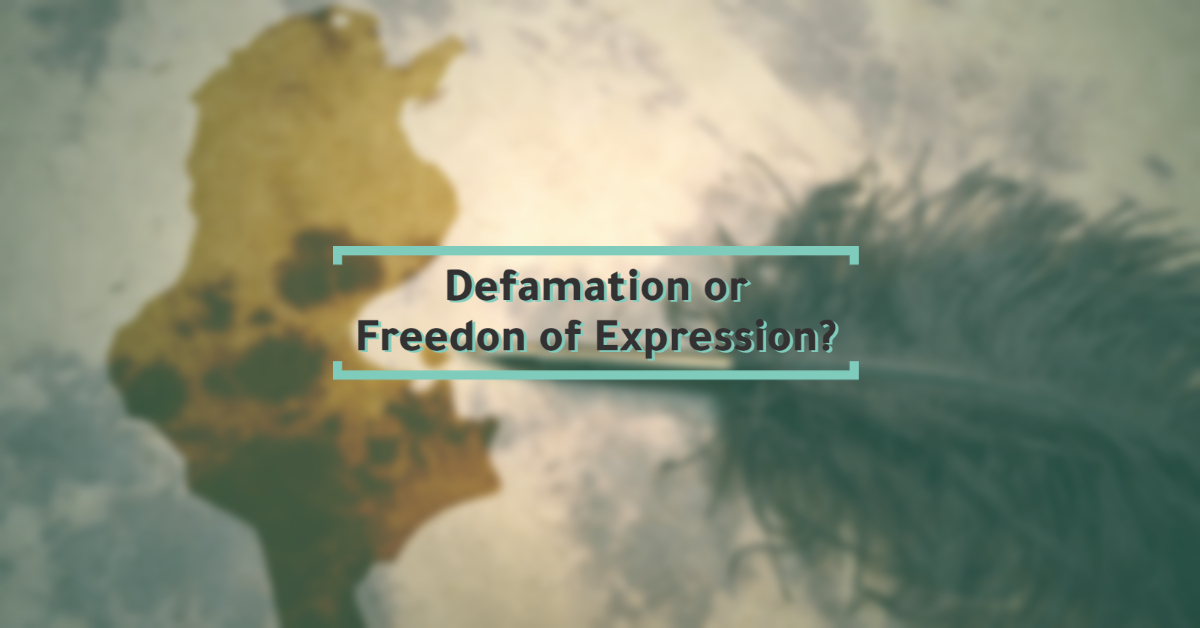Pro-government pages on Facebook are systematically leading defamation campaigns against Tunisian judges, accusing members of the opposition of “ethical corruption.” In late 2021, Facebook pages published posts about the personal life of Tunisian judge Afif Jaidi, claiming to have detailed proof of “the judge’s homosexuality.”
But Jaidi is not the only victim of these unethical attacks currently in full force in Tunisia.
“Signatory Judges”
Many of the judges who signed the petition calling for the dismissal of judge Tayeb Rached, who has been accused of money laundering, became targets of systematic defamatory attacks led by “businessmen and political lobbyists,” according to Tunisian Court of Cassation judge Hamadi Rahmani. In a talk with SMEX, Rahmani said that “the campaign intensified when they opposed the coup led by Kais Saied,” adding that “men and women judges who challenged the president were harassed after every statement and rumors were fabricated about them to discredit their work.”
Defamation campaigns led by supporters of President Kais Saied peaked on August 8, after the issuance of a statement rejecting Saied’s decision to head the Public Prosecution and his attempts to control the judiciary.
According to judge Rahmani, following this statement, the defamation campaigns were escalated and even reached “judges who are not involved in public affairs, fabricating ethical rumors to denigrate them.”
The main objective of these attacks is to set the stage that would allow President Kais Saied to strengthen his grip on the judiciary. By compromising the judges’ positions, the president aims to gain legitimacy over his decisions with the least resistance.
Rahmani denounced what he described as the government’s “reluctance” to hold virtual pages and persons accountable for defaming judges, recalling that “a Facebook activist allied with President Saied already confessed to receiving sums of money in return for launching defamation campaigns against the president’s opponents.”
He also asked: “Why is the president, who now controls all the authorities, not addressing the situation? It is clear that Saied is refusing to act because these campaigns in fact benefit him.”
Defamation or Freedom of Expression?
Many believe that defamation is part of the freedom of opinion and expression, which was denied to Tunisians for more than half a century. Human Rights Watch has previously denounced prison sentences for defamation charges and called upon Tunisia in 2013 to amend those penalties in line with human rights standards, especially when the target of defamation is a public figure.
Chawki Gaddes, the president of the National Authority for the Protection of Personal Data, a government body that monitors the protection of personal data, told SMEX that “those accused of defamation and denigration are punished by virtue of the Penal Code, whereas the Authority seeks to offer advice on the safe and proper use of such penalties.”
The Penal Code defines the crime of defamation as “committing slander against any person, making false claims about them, or damaging their reputation.” Defamation is punished by imprisonment for a maximum period of two years and a fine of USD 80. Article 128 of the Penal Code imposes a similar penalty on those who defame civil servants.
The National Authority for the Protection of Personal Data believes that the “safe use” of Facebook means restricting the comments feature on its posts, as it believes that “Facebook is an unsafe space.” In fact, Gaddes has stated that “the Authority has several reservations regarding Facebook’s rules.”
In this context, digital security expert Yossr Jouini believes that “the right to privacy is a fundamental condition for practicing freedom of expression. Therefore, unwarranted encroachment on people’s privacy may directly or indirectly undermine freedom of speech and impose self-censorship.”
With regard to public figures, Jouini explained to SMEX that “the question of deciding whether to give precedence to privacy or freedom of expression depends on the circumstances and reality of each individual case.”
However, charges of defamation are still used to punish those with opposing views. In December, Human Rights Watch criticized “Tunisian authorities’ prosecution of citizens who publicly criticized the president under the charge of defamation,” adding that of the cases examined by HRW that month, five were related to “defaming the army and insulting the president.”
(Commentary–23/3/2022) “Defamation falls under freedom of expression when it is directed at those in power, including politicians whose decisions control people’s lives,” stressed SMEX Executive Director, Mohamad Najem. “What we’re seeing in Tunisia, however, is a network that works for the benefit of influential people and politicians by discrediting critics through defamation.”
“It is important to note these power dynamics in society so citizens are protected. We must be aware of the influence of powerful politicians who are trying to control the public discourse by threatening defenseless individuals,” explains Najem, adding that, “critics are shamed and exposed to moral and even physical abuse, when Article 19 of the International Covenant on Civil and Political Rights explicitly calls for taking action in this regard.”
Are Apologies Sufficient?
The charge of defamation is used in Tunisia for political ends by all parties. In January, Tunisian actor Atef Ben Hassine, who is part of the campaign to justify President Kais Saied’s program, attacked media figure Safa Dhaflaoui in an offensive post he published on Facebook.
In response, Dhaflaoui filed a lawsuit against him for “defamation of character.” In a talk with SMEX, Dhaflaoui said that, in her opinion, Ben Hassine’s attack against her was due to the fact that “he did not like what I said and considered it to be in defense of Ennahda MP Noureddine Bhiri, especially since I said that his wife was a strong women regardless of the details of her husband’s case.”
Dhaflaoui later withdrew her lawsuit, after the intervention of mutual friends and after Tunisna TV channel aired an apology video.
On January 15, Ennahda MP Bechr Chebbi addressed a group of opponents of the coup, stating that “the decision to appoint Kamel El Fekki as Governor of Tunis was the product of a sexual affair between Ridha Chiheb Eddine Mekki, a friend of President Kais Saied, and the governor’s wife, Sonia Charbti,” who is close to the president.
Charbti refused to comment on these allegations, describing them as “foolish” in a talk with SMEX. She also said that “the patriarchal mentality has been frustrating for many women from different intellectual backgrounds, and the use of such discourse only reveals their inability to fight us with logic.”
Charbti filed a lawsuit against Ennahda’s MP in the suspended parliament, while Chebbi apologized in a Facebook post, claiming that his words “were taken out of context.”
Even within the parliament suspended by President Saied, MP Fayçal Tebbini was the victim of a defamation campaign after the Dignity Coalition MP Rached Khiari leaked a video recording of a sexual encounter in June, claiming that Tebbini appeared in it.
Khiari also published pictures of intimate conversations which he claimed were between Khiari and a woman. Tebbini told SMEX that he filed lawsuits against all those involved in leaking the video, including two lawsuits against Khiari himself.
He accused MPs Rached Khiari and Seifeddine Makhlouf of fabricating the video and conversations after he criticized the Speaker of Parliament last year and urged MPs to sign a petition to dismiss the Speaker.
Political opponents use online defamation campaigns to their benefit. This is especially true since Facebook’s reach in Tunisia is very high, with more than 7 million users. For example, in 2019, Facebook posts supporting candidates for the presidential elections published nearly 334 Facebook posts to promote their preferred candidate by defaming their opponents. This included charges such as “corruption, forming mafias, terrorism, murder, fraud, and theft.”
As defamation is increasingly being used as a political and/or retaliatory tool in Tunisia, the only option for the victims of such campaigns in most cases is to resort to the judiciary.
However, many believe that the judiciary is not taking prompt action unless confronted with “insults against the president, defamation of a civil servant, or denigration of the army and undermining its morale.”
For more information on this issue, watch this episode by SMEX on Facebook: “Defamation Campaigns in Tunisia: Who’s responsible and how can we counter them?”



